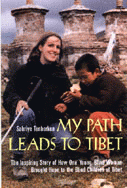
|
 You can purchase "My Path Leads To Tibet" at Amazon.com DESCRIPTION Vivid, brisk account of a young German woman's efforts to establish a school for the blind in Tibet. Diagnosed with retinal disease in early childhood and completely blind by 13 the author retains visual memories that help her navigate sightlessly. Tenberken still sees colors in her mind and uses them as a mnemonic device to remember phone numbers and formulas and to visualize landscapes and her surroundings. She also has remarkable parents who have encouraged her independence and sense of adventureat one point her mother even helped out at the school in Lhasa. Tenberken, who did graduate work in Asian studies, describes how her obsession with Tibetan manuscripts led her to devise a Tibetan Braille alphabet so she could read texts herself. In the late 1990s, needing more freedom and tired of being reminded of her supposed limitations she flew alone to China and then traveled by road (an exhausting experience) to Lhasa, where she was determined to found a school. There were no training facilities for blind children; if their families were poor, they were left on the street or alone in their rooms without any teaching, diversions, or stimulation. An accomplished horsewoman, the author recalls often hazardous journeys on horseback over some of the most mountainous terrain in the world to find pupils. She describes her efforts to raise funds, to get official Chinese permission for her school, and to find suitable premises and staff. None of it was easy, but the school eventually opened and was an instant success. Then the funding dried up due to bureaucratic bungling back in Germany, her venal landlords evicted her, and the government insisted she leave the country immediately. Though discouraged, Tenberken rallied her forces and, after a torturous overland journey to Nepal and a visit to Germany, found ways to continue her work. Impressive, moving, and refreshingly free of sentimentality and self-pity. (First printing of 50,000; author tour) Kirkus Reviews "This brilliant and courageous blind woman not only has
an extraordinary story to tellof how, alone, she entered Tibet, devised
a Tibetan Braille, and single-handedly established schools for the
blind and altered the traditional attitude to blind people (who had for
centuries been seen as cursed, and treated as lepers or worse)but tells
it with extraordinary grace, candor, modesty, and humor. My Path Leads
to Tibet is as delightful as it is enthralling, and carries one along,
in a sort of wonder, from the first word to the last." "How can we use the power of high technology to narrow
the gap between rich and poor rather than widen it? This is the great
problem that our politicians and scientists and entrepreneurs have
failed to solve. And here is Sabriye Tenberken, a young woman with
courage and imagination, showing us how to solve it " "If you only read one book this year, read this one.
Sabriye Tenberken's life is a light to all of us, and her story is its
"ray".By turns courageously honest, genuinely heartwarming, and
uniquely inspiring. She takes us on an extraordinary journey where we
witness firsthand the miracles that can happen when one person is truly
determined to make a difference. As an Lylas G. Mogk, M.D., The Inspiring Story of How One Young Blind Woman Brought
Hope to the Blind Children of Tibet Sabriye Tenberken. When Tenberken,
whose battle with retinal disease left her blind at age 13, was in her
20s, she studied Tibetan culture at the University of Bonn. Frustrated
by the awkward character-recognition machinery she had to use to read
Tibetan materials, she devised a Tibetan braille alphabet, so that once
translated, works
could be directly readable by the blind. What followed seemed natural
to
her: she'd go to Tibet and start a school to teach this braille to
blind Tibetan
children. Traveling on horseback over treacherous mountain passes,
sleeping
in rat-infested huts and dealing with self-interested charitable
bureaucracies,
Tenberken managed to keep her humor and courage. She succeeded in
establishing
a school, and her organization, "Braille Without Borders" continues the
literacy
mission in other countries. While stories of triumph over adversity are
often
compelling, Tenberken gives something more: her own point of view on
life
as a blind person. Why does she go out of her way to visit stunning
landscapes?
Why are colors meaningful to her? "I consider myself a very visual
person,"
Tenberken explains, aware that not all blind people - or "sighted"
people,
for that matter - have "visual imaginations" "Besides, why wouldn't a
world Other
languages:
|
||||||||||||||||||||||||||||||||||||||||||||||||||
